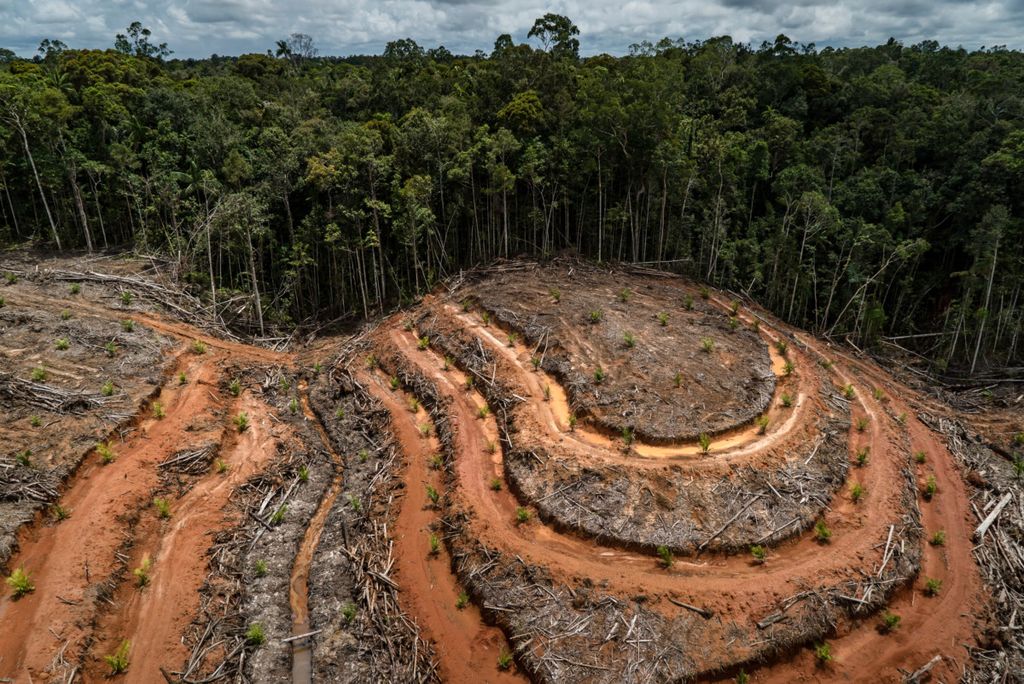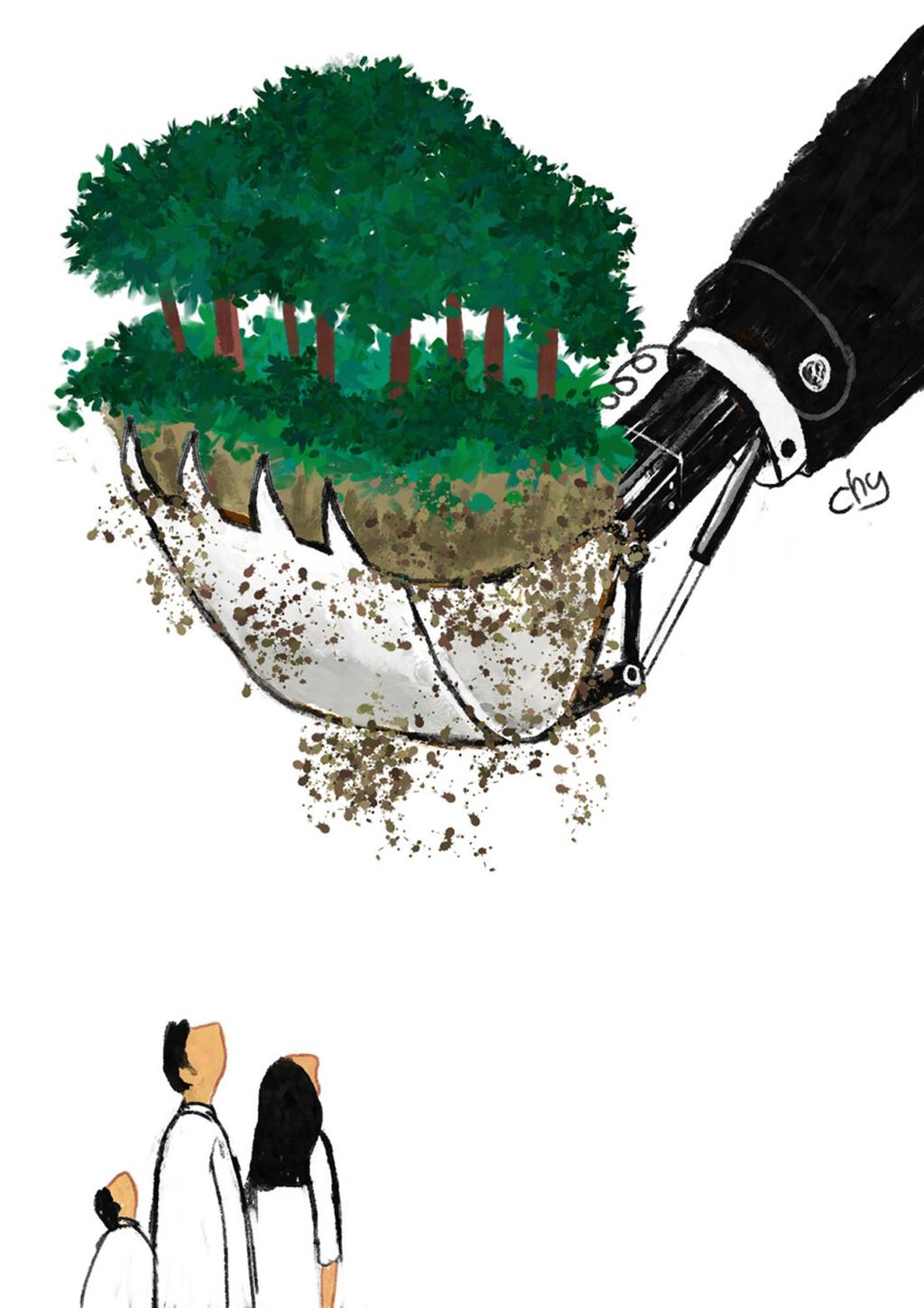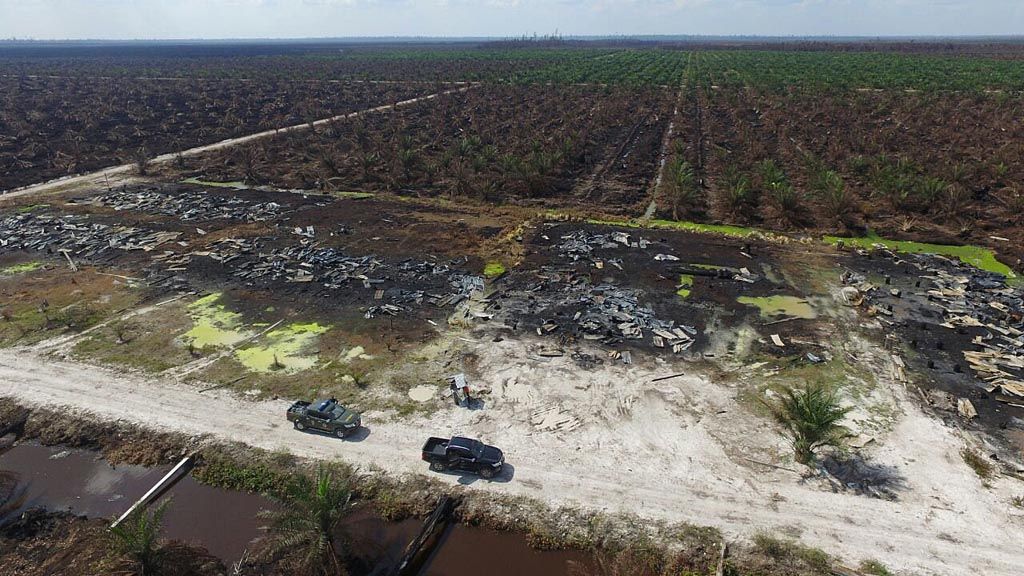150 Years of Shackles on Land Rights
Precisely 150 years ago, the Dutch government adopted the concept of domein verklaring (domain statement) to claim control of most of the land in the archipelago.

Greenpeace investigation uncovers massive deforestation as Indonesian Government minister arrives in EU to defend palm oil industry. In the picture: landcover, forest clearance and plantation development in PT Megakarya Jaya Raya (PT MJR) palm oil concession.
Precisely 150 years ago, the Dutch government adopted the concept of domein verklaring (domain statement) to claim control of most of the land in the archipelago.
This concept is still alive in the modern era of Indonesia and has led to widespread land conflicts and poverty. In 1870, the Dutch government adopted the Agrarische Wet (Agrarian Law). This law contains provisions that continue to be remembered in history as the principle of domein verklaring: that all land that does not have proof of ownership is considered the domain of the state.
Through this domain statement, the colonial authorities claimed ownership of most of the land in Java and then outside Java. The concept of the domain statement is important because it allowed the Dutch to exploit Indonesia\'s wealth by weakening the control of other indigenous and traditional peoples over their land.
Still alive
The domein verklaring is also important because this concept is still "alive". Since 1870, the state (the Netherlands and later Indonesia) has held effective power over most of the land in Indonesia. The principle that was built on the domein verklaring — that the interests of the state are prioritized over the rights of citizens over the land — is still a common character of land tenure in most of the territories of Indonesia. It is time to solve this problem and limit too much control of the state over the land.
After successfully expelling the Netherlands in 1945, the newly independent Indonesian government basically retained the state control over the land. For example, Article 33 of the 1945 Constitution states, "The earth, water and natural resources contained therein are controlled by the state and used for the greatest prosperity of the people". Only in 1960, Indonesia almost completely abolished the domein verklaring by adopting the Basic Agrarian Law (UUPA). This law explicitly aims to overcome the injustices created by Dutch colonial law. This law also recognizes customary land rights.
Also read : Waiting for Good Luck from the Industrial Estates

However, the New Order regime (1965-1998) changed course and even strengthened state control over land. In 1967, the New Order adopted the basic forestry law that revived the domein verklaring principle by establishing 143 million hectares (almost 75 percent of Indonesia\'s total land area) as forest area. President Soeharto decided that land in this area was controlled by the state (through the Forestry Ministry) and could not be owned by local communities in Indonesia.
Although the total area is now considerably shrinking, the state still claims 63 percent of Indonesia\'s land area as forest area. Like the colonial government in the past, the state uses its control of land to make concessions to corporations. Government data in 2017 shows that 95.76 percent of forestry concession licenses are granted to corporations, and only 4.14 percent is allocated to the community. On the basis of this concession permit, the company gets the legality to take over the land of residents who already live and work on the land. Therefore, it can be said that domein verklaring is still alive.
Also read : Environmental Issues Need Attention
This limitation of land ownership still has a big impact on the welfare and quality of life of the Indonesian people every day because it causes conflict and poverty. We can use as an example, the number of land conflicts in Indonesia. In a number of areas rural communities held demonstrations, land occupations and lawsuits to protest the confiscation of their land by mining, oil palm, plantation and forestry companies. Local media is frequently full of such news. The Agrarian Reform Consortium (KPA) noted there are currently 410 conflicts, affecting around 87,000 residents.
State control over vast land also affects the economy of individual citizens. Without the recognition of land ownership, it is difficult for communities to access loans to banks. The state control over land is also an obstacle for the communities to benefit from the natural wealth above and below that land. Not infrequently residents are arrested for felling trees or mining on land that they have considered as their own.
Half-hearted reform
The negative impact of state control over the land on the welfare and quality of life of the people is not that it never receives attention. Over the years, activists and (several) reformist policymakers have been involved in removing the domein verklaring principle and limiting the state\'s excessive control of the land and natural resources (SDA). The most prominent example of change efforts is the issuance of Temporary People\'s Consultative Assembly (MPRS) Decree No. IX/2001 concerning agrarian reform and natural resource management. This provision aims to give citizens more recognition and control over land by pushing the agrarian reform agenda, but this has not yet been implemented.
Similarly, in 2012, a lawsuit filed by AMAN resulted in a Constitutional Court ruling that mandates the state to formally recognize the rights of indigenous peoples to forests and land so that in theory it would change the state control over forests. However, once again the implementation of this ruling is still limited: until February, formal recognition of customary forests was still limited to 65 indigenous communities and covering a very small area of only 35,150 hectares.
In recent years, the Joko “Jokowi” Widodo government has implemented TORA (land of agrarian reform objects), an ambitious program to distribute certification and redistribute land to the communities. However, this program still has not touched many complicated and fundamental issues. So far, land titles have increasingly been given to those whose land ownership has been well documented and (mostly) located outside the forest area so the impact is still limited.
Also read : Gambling on Agrarian Bill

Aerial view shows the destruction caused by a forest fire at a palm oil plantation in Rokan Hulu, Riau province, Sumatra, Indonesia September 2, 2016. Picture taken September 2, 2016. Ministry of Environment and Forestry Republic of Indonesia.
In reality, in the last 20 years, the House of Representatives has adopted several new bills — such as the SDA Law (2004), the Plantation Law (2004) and the Mining Law (2009) — that increasingly establish the state control over the land. The draft of Omnibus Law on Job Creation, which is currently being debated, also proposes the extension of the validity of the rights to cultivate (HGU) up to 90 years and intends to form a government body (land bank) that will have the mandate to acquire, manage and distribute the land, including for investors and state projects.
In short, despite a long history of activism and legal reform efforts, extensive state control over the land is almost unshakeable.
Land and oligarchy
Why have efforts to reform this principle so far been unsuccessful? Despite the complexity in designing an effective agrarian reform, we need to recognize that there are structural problems: the fundamental reason why the domein verklaring is still alive is because there are political and economic elites who can benefit greatly from the state control over the land.
In the New Order era, the ruling elites accumulated their wealth by cooperating with domestic and foreign timber entrepreneurs. Since the downfall of Soeharto, cases of corruption which frequently emerge show that many political elites and bureaucrats have used the state\'s authority to grant concessions, to make a lot of money. Not infrequently, a regent, governor or elected House member uses his influence to direct concession licenses for companies owned by family members or friends.
Also read : Downstreaming Natural Resources
Surveys of the sources of wealth of the ruling elites illustrate the importance of the state control over the land for the elites in Indonesia: the wealth of many political elites comes from natural resource extraction and oil palm companies, which rely on concession licenses granted by the state. Ironically, those who have the power to make laws that will change the state control over the land are also those who have the greatest interest in maintaining it.
Given the negative impact of the domein verklaring on the welfare and quality of life of millions of Indonesian people since 1870, it is time for Indonesia to make a more serious effort to completely eradicate this colonial legacy.

Ward Berenschot
This year does not only commemorate 150 years since the adoption of the domein verklaring principle, but it has also been almost 20 years since the House issued a decree related to agrarian reform. It is time for Indonesia to pay more attention to the call and celebrate 150 years of the domein verklaring by eliminating it.
Ward Berenschot, Professor of Comparative Political Anthropology at the University of Amsterdam and Senior Researcher at KITLV Leiden.